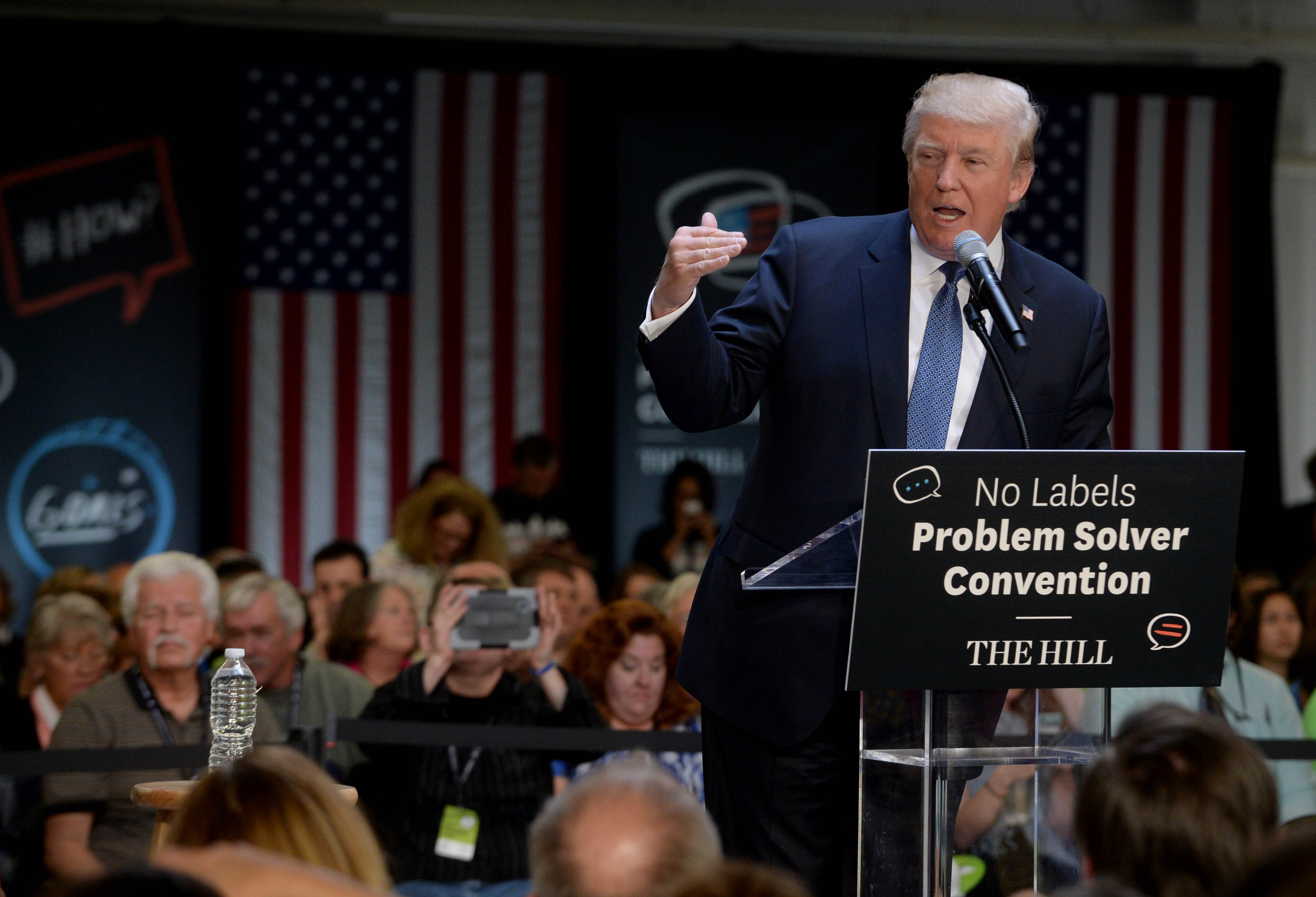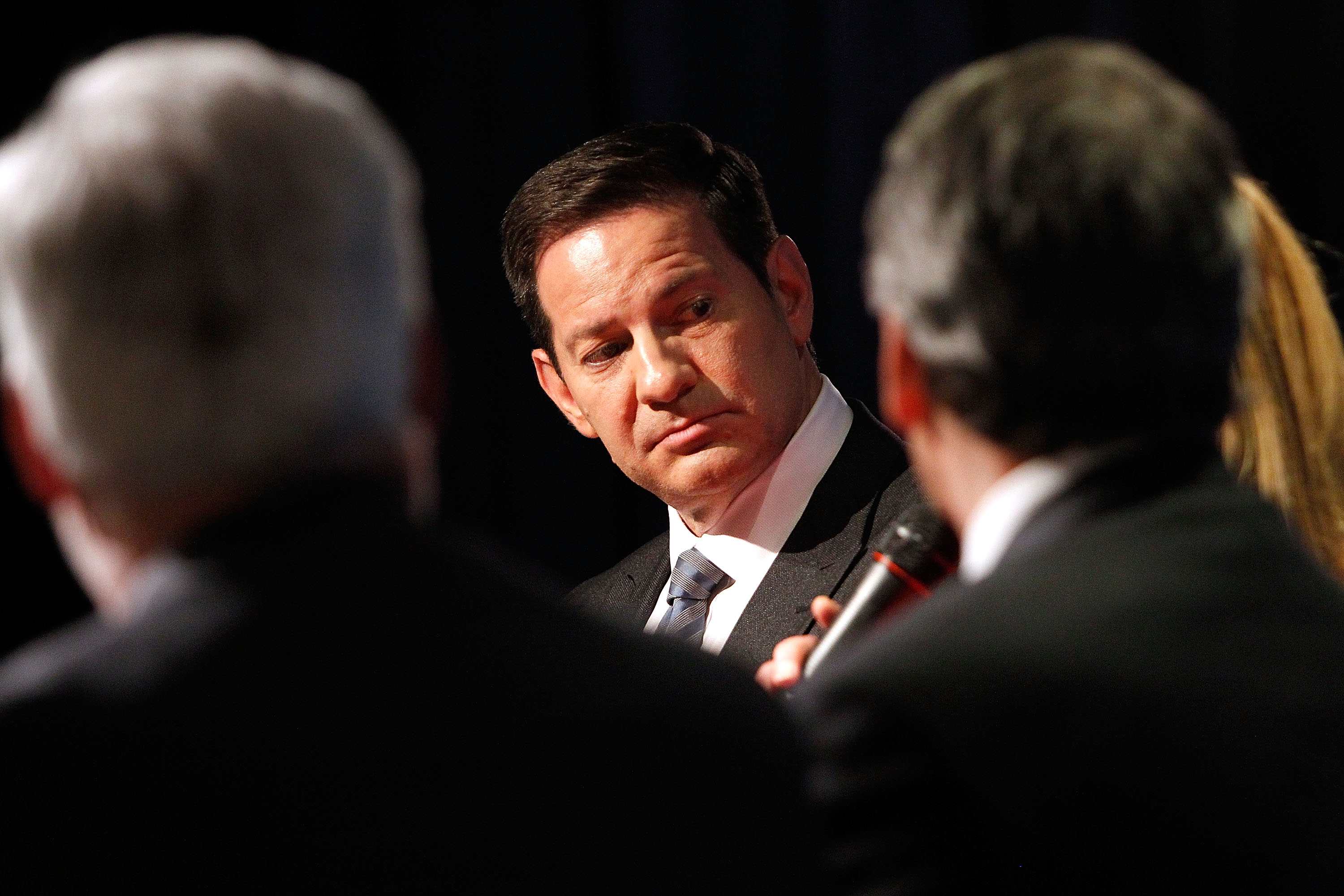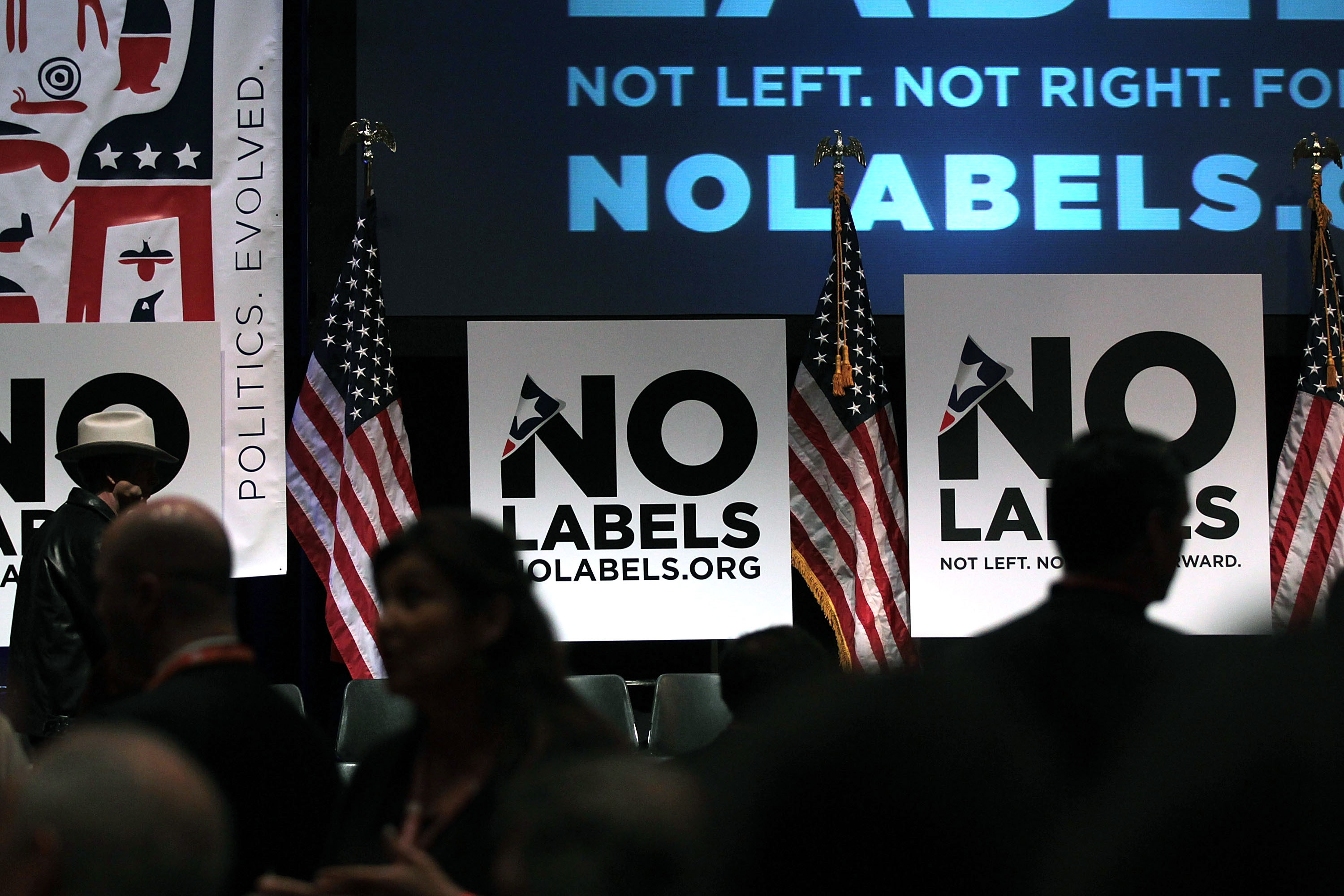Over the past year, the centrist group No Labels has spearheaded an ambitious $70 million project laying the groundwork for a unity ticket presidential campaign in 2024.
For that effort, its founder and CEO, one of Washington’s most successful fundraisers, Nancy Jacobson, has enlisted the help of a number of major donors and sought support in top political allies. Outgoing Gov. Larry Hogan (R-Md.), who is considering a presidential run, is the group’s co-chair. Former Secretary of State Mike Pompeo recently met with the group’s executives and donors in Dallas.
But behind the scenes there is turmoil inside the organization. Interviews with 14 former employees—including five who left in the last few months—and four other people familiar with No Labels reveals a cutthroat culture, one where staffers are routinely fired or pushed out, have little trust in management, and believe the workplace environment can be difficult for minority and female colleagues.
The internal discord threatens to hamper the well-financed plans that the group has for the next election. Former aides say that staff turnover and bad relations with management make executing on projects more difficult. One former employee said she suffered a panic attack under the intense pressure from her superiors. These staffers add that the image No Labels projects of an institution striving to reform the country’s rigidly partisan political system hides what one former aide said is a “toxic” culture.
Many of the people were granted anonymity for fear of reprisal, though some aired their complaints to POLITICO on the record. Among their allegations:
- There is lingering discord over the decision to hire and ally with individuals who left prior jobs under allegations they’d sexually harassed women.
- Two former staffers said they witnessed one of the organization’s few Black employees being singled out to discuss race issues at a staff meeting.
- At least three ex-aides have sought remuneration from the group over the nature of their termination in the last two years.
- Two female staffers recalled management telling female employees to dress more conservatively after a colleague was improperly touched by a male member of Congress at a No Labels event.
- Staffers are bombarded with emails and demands by Jacobson. They come at all hours of the day, sometimes with odd requests, such as changing the employer listed on their LinkedIn profiles to “America” to throw off a journalist trying to locate them.
“The internal environment of No Labels is a hostile one which is clear by the fact that no one stays there very long,” said Katie Young, who worked as deputy director of field operations at No Labels from 2019 to 2020. Now an operative for the Republican Party, she said she left the group amicably. “You either agree blindly to everything the CEO wants or they get rid of you.”
In the defense of both Jacobson and the organization, No Labels organized several lengthy Zoom calls featuring roughly a dozen senior officials on each. During those calls, they defended Jacobson’s management of No Labels, saying it is driven by mission and not ego. They noted that she is loath to accept public praise and rarely appears at society events in Washington.
They also insisted that staff complaints, including by those seeking remuneration for the nature of their departure from the group, were simply the product of aggrieved ex-workers. They expressed a missionary zeal for the organization and made the case that the taxing workload is justified by the goals.
But the group’s leaders also conceded that their office culture is demanding. Those who bought in thrived, they said. Those who didn’t, faltered.
“There’s a sense of urgency at the organization. There is a sense of tension in the organization because we want to get this stuff done,” said retired Adm. Dennis Blair, a longtime No Labels board member, who called the group’s work in Washington a “David vs. Goliath” story. “This kind of work is not for everybody, and I think some of the people you talked to simply did not adapt to that approach.”
*****
No Labels was started in 2010 by the Democratic uber-fundraiser Jacobson with an aim to make the country less polarized by supporting legislation that had significant bipartisan backing and by championing lawmakers willing to work across the aisle.
The group has had its share of critics over the years. Political operatives, particularly on the Democratic side of the aisle, have warned that its projects, including the launch of a unity-ticket project, are a waste of funds. They accuse it of valuing the veneer of bipartisanship more than important legislation and of adopting quixotic causes and candidates.
In 2015, No Labels featured Donald Trump at its “problem solver” event in New Hampshire. This past spring, the group posted a tweet calling the Jan. 6 committee “a partisan exercise,” after which it endured a wave of public backlash, put out a clarifying statement, and then went dormant on Twitter for five months.

Officials at No Labels say detractors refuse to see the work it’s undertaken, including its legislative push to help pass Covid relief legislation, the bipartisan infrastructure bill and modest gun restrictions enacted after the shooting in Uvalde, Texas. No Labels also said that it raised $18 million this past two-year election cycle, split evenly between Democratic and Republican candidates for Congress.
But as the money flowed in, staff turnover has remained high and, among lower ranks, morale has remained low. This year, at least 11 full-time employees or contractors have left, out of a total of around 20, according to former employees.
No Labels declined to confirm the numbers but said that many organizations have struggled with the “Great Resignation” during the pandemic. They suggested that some staffers left because they could not fully commit to being non-partisan and that others didn’t share in the dedication to the cause.
In a statement to POLITICO, Jacobson said she “set very high standards” for herself “and for everyone who works with our organization.” She expressed pride that her staff was “almost all female” and said she encouraged her team to be “independent, entrepreneurial and committed to excellence.” She also said the group’s work “requires a relentless staff of people who are meticulous and capable of making something out of nothing.”
“For those people terminated by our organization in the last year and a half who still carry grudges and felt the need to smear our team and me personally I say: I am sorry it didn’t work out for you here,” she added. “I hope you find your passion and calling.”
Jacobson declined to be interviewed. Instead, she posted her full statement on Medium well before this story was published.
A former finance chair of the DNC and wife of Mark Penn — the former pollster for Bill and Hillary Clinton — Jacobson is regarded as one of the most gifted fundraisers in the nation’s capital. But those who have worked under her have questioned her managerial style and strategic priorities.
Former employees said they were poorly compensated and had to work breakneck hours on projects that constantly shifted. One former employee recalled Jacobson saying she’d “hired me because I was cheap and ‘affordable.’” Another said she would usually work over 100 hours a week on a $40,000 salary.
“I understand the ambitious type of leader who wants to get things done and that can create a churn and burn sort of atmosphere or feel,” said Jessica Sunday, who worked for No Labels as a vice president last year. “But I will say that you can still, as a leader, empower your staff. What was lacking there is that her employees were not set up for success.”
Sunday, who now works for a health care company, left her post at the group after just three months. “I was not happy with that environment whatsoever,” she said. “I just realized very quickly working there that it was not the right kind of cultural fit for me.”
On one Saturday morning earlier this year, Jacobson sent 65 emails to staffers before 9 a.m., according to two former employees who tallied those they’d received either directly or as part of a larger group of recipients. The requests were to set up meetings for Jacobson, gather bios of donors and compile lists of current or potential donors. The two former employees said they found the number staggering for a weekend morning.
Some current employees that No Labels put POLITICO in contact with said Jacobson’s management style was what made the group successful.
“Is Nancy tough and hard-charging?” said Holly Page, a senior adviser at the group. “Yes, but guess what? We’re in a tough town. We have a tough mission and she knows it.”

Others offer that she could be welcoming and personally supportive. In one of the Zoom calls set up by the group, No Labels vice president McKinley Mason Scholtz said Jacobson had been a critical presence for her during and after she had a crisis pregnancy earlier this year.
“Nancy and these women at No Labels went above and beyond to support me when I was at my weakest and at the most trying time of my life,” she said.
Those current staffers also noted that until the end of last year, Jacobson did not draw a salary, illustrating the nature of her commitment to the group. It was only under encouragement, No Labels officials said, that Jacobson started taking a salary this year (they declined to disclose how much Jacobson earned).
But while Jacobson has worked for years without compensation, No Labels has made payments to firms and entities that were owned or partially owned by Stagwell, the company headed by Jacobson’s husband, Penn. That includes Targeted Victory, which received more than $563,000 from 2017 to 2019 for its work as a “revenue processor,” according to the group’s 990 IRS forms, and Harris Telecom LLC, which received $428,100 for “media” in 2021, according to its 990. No Labels said all payments were approved by its eight-person board.
*****
In at least three occasions over the last two years, former aides at No Labels have sought compensation for the nature of their departure from the group.
One of those cases involved a former outreach manager who has enlisted the services of a lawyer, Reshad Favors, to get No Labels to pay $120,000 for “race discrimination and retaliation” in relation to her termination.
The outreach manager, who was granted anonymity to protect her ability to secure future employment, said she was told by Jacobson that No Labels wanted her to find more people of color to work for the organization. She found the request offensive since she was one of only two Black staff members at the time.
“I understand the necessity of having diverse representation at all tables, but this request was performative – make the only Black staffer we have on this side of the house responsible for our lack of Black engagement,” she said. “What they were asking me to do is be their token.”
No Labels insisted that there was nothing nefarious about the request, since outreach was part of this person’s portfolio. “Her job was to go out and bring more people into the conversation,” Page said. “She was an outreach coordinator. That’s what she did, or was supposed to do.”
Page and other No Labels executives said the outreach manager was a poor performer who decided to speak out as a form of “extortion.” As evidence, they pointed to the letter Favors sent seeking compensation for lost wages, legal fees and the cost of the emotional duress his client said she endured from working with No Labels.
But the letter No Labels sent had a section removed. When asked, the group offered to share the full letter on the condition they got to respond to all the contents in it. Ultimately, Favors supplied the full letter, revealing that No Labels had taken out a page-and-a-half list of complaints the outreach manager had leveled at the organization, such as being chastised by a superior for not meeting metrics “due to her attendance at a family funeral.”
No Labels co-executive director Margaret White called the outreach manager’s allegations “absurd,” saying that No Labels and its employees had no records related to her claims or knowledge about it.
A lawyer for No Labels, Dan Webb of Winston & Strawn LLP, said the group would not confirm the existence of any settlements with those three people. But a day earlier, White had said in an email to POLITICO that the group had paid one claim, which she called “spurious” and said they regretted settling. White said that in the case involving the outreach manager, No Labels would not pay “a dime.”
The outreach manager said she believed her experiences exemplified larger issues with the group’s culture. She recalled a November 2021 meeting with a donor in Chicago that she attended with two colleagues, senior adviser Ryan Clancy and vice president Megan Shannon. During the meeting, the donor told her “I assume you’re a Black” and went on to blame the deterioration of Chicago on “Blacks.”
Both Shannon and Clancy confirmed that they didn’t rebuke the donor. Instead they attempted to redirect the conversation. They said they regretted not speaking up and have stopped working with the donor, whom they did not identify.
“No Labels was not going to protect us,” the former outreach manager said. “It was donors before us.”
Former employees not seeking remuneration said the aftermath of the death of George Floyd also illustrated what they saw as the group’s blind spots on matters of race.
Staff were angered that No Labels released a statement saying the pain caused by the killing “won’t be solved in the streets,” which they interpreted as an attack on Black Lives Matter protesters. During a subsequent staff meeting, Jacobson told employees they could quit their jobs if they didn’t like the organization’s position, according to two former employees who were there.
Clancy said that the statement was mischaracterized at the time, noting that it warned that gathering protesters could fuel the Covid pandemic. He also said that some staffers wanted No Labels to use the Black Lives Matter hashtag on the organization’s social media accounts— a request it rejected since, Clancy said, BLM is “the name of a very specific advocacy organization that was very controversial and advocated for lots of specific ideas that many Americans don’t support.”
But the internal staff frictions extended beyond reaction to the group’s statement. Two former staffers said they were taken aback when one Black employee was singled out at the meeting and asked for her opinion on the Floyd murder. The woman, who has since left the organization, declined to comment.
Benjamin Chavis, president of the National Newspaper Publishers Association, a former CEO at the NAACP and a No Labels volunteer, said he believed the group has a “commitment to diversity and inclusion and treating all people with decency and respect.”
Darnell Goldson, a Connecticut co-chair of the group since its conception, who had been asked by No Labels to reach out to POLITICO, also said he was a firm believer in the organization. But he implicitly conceded there was work to be done when it came to matters of race.
“No matter how righteous the mission of the organization may be, if it doesn’t show equity in its hiring practices, I cannot support them,” he said in a statement. “I have high hopes that No Labels will meet my expectations when it comes to its staff and leadership.”
*****
No Labels is far from the only political institution that has struggled with staff turnover and workplace diversity. And the organization doesn’t deny that work there can be a grind.
“This work is hard. On many days, we’re pushing a rock up a hill in a town where cooperation is discouraged and far too many profit from, or perpetuate, pitting Americans against one another,” Jacobson said in her statement.
But No Labels has brought on board employees who have contributed to those workplace tensions.
The hiring of journalist Mark Halperin as a senior communications adviser in April 2021 created turmoil inside the organization. Halperin was accused by multiple women in 2017 of sexual harassment, misconduct or assault — some of which he apologized for and others he denied.

Co-executive director Liz Morrison told POLITICO that No Labels was sensitive to employee concerns after multiple staffers objected to Halperin joining the ranks. But she said Halperin was “incredibly brilliant” and worth hiring. In 2021, Halperin was No Labels’ highest-paid employee, with the organization’s 990 tax form reporting he made nearly $260,000 in total compensation.
No Labels said it has never had a complaint about any employees or contractors engaging in sexual harassment at the group. But one employee POLITICO spoke with expressed discomfort at having to work alongside Halperin and two others criticized management’s handling of the situation.
A former employee said that staffers were told by their bosses they could ask Halperin about the accusations on an introductory Zoom call. The forum became “very weird,” according to a person who was on the call. “What am I going to say to this man?”
Halperin did not respond to a request for comment.
No Labels has made at least one other personnel choice that has left staff befuddled. Former Rep. Tom Reed (R-N.Y.), who resigned a year after being accused of sexual misconduct by a lobbyist and who was co-chair of the No Labels-inspired Problem Solvers Caucus in the House, is currently a surrogate for the group.
Reed, who has apologized for his wrongdoing to the lobbyist, said he believed that “No Labels is the only beacon of hope that is bringing people together and has demonstrated success doing just that.” In an interview, he described his role as “an ambassador for the cause.”
Top No Labels leaders said they have a zero tolerance policy when it comes to sexual harassment. They pointed to an incident in late 2019, when a male member of Congress touched a female employee’s lower back when talking to her at a No Labels breakfast event at the Mayflower Hotel. The employee expressed discomfort to Morrison.
“We immediately reported this to the co-chair of the Problem Solvers Caucus and immediately contacted that member to make clear in no uncertain terms that this behavior was unacceptable and would not be tolerated by this organization or anyone associated with it,” Morrison said. She did not name the member but added that he no longer serves in Congress or has a relationship with No Labels.
But other former staffers had a different read of the fallout from the Mayflower incident. They noted that afterwards, Morrison and White told multiple women on staff to dress more modestly, a request that two employees who received it thought was victim blaming.
Morrison confirmed that she made the suggestion, saying that she too was given that advice as a younger staffer and thought it was prudent.
*****
Management at No Labels is aware of the staff concerns and complaints. And they have taken steps to stop them from spilling into public view.
White said employees have to sign an NDA as part of their onboarding at the organization. And in an apparent effort to combat negative stories that have occasionally made their way into the media, No Labels paid $135,000 to a company called Reputation Defender that helps clients get better Google search results and moves negative pages lower, according to its 990 form from 2020. Morrison declined to comment on why No Labels hired that company.
After word got out at No Labels that POLITICO was working on an article, this reporter received 18 emails within three hours from No Labels volunteers or state co-chairs praising the organization and its work and disputing the idea that there were unhappy staffers. During the following two days, another 16 volunteers sent emails with similar messages.
Blair emailed No Labels state co-chairs to try to get them to help shape the article. That email was subsequently leaked to POLITICO. In it, he implored recipients to send personal notes to this reporter “saying you have been made aware of his upcoming story, and that you want to share your experience with No Labels and our team and why this work is so important to you.” He said his hope would be that the testimonials could “prevent this story” from being published.
Such wartime footing is common at the organization, ex-employees say. But it also creates a split among employees, with one group of staffers adopting a passion for the cause while others are largely fearful of crossing management.
The divide among staff has been exacerbated by requests and demands from management, former staffers say. A few months ago, Jacobson instructed employees to change their employer name from No Labels to “Political Organization” or “America” on LinkedIn, according to two former employees who worked closely with Jacobson. Morrison said the instruction came because another reporter working on a No Labels story was trying to contact staffers through the professional networking site.
Some people at the group found the instruction strange. But others embraced it. The LinkedIn profiles of White, development director Brittany Prime and Jacobson began listing “America” or “Political Organization” as their employer. (Jacobson changed her listing back to No Labels after POLITICO asked about it for this piece.)
But while some former staffers found management’s requests frustrating, they said it was the pressure to execute on them that caused difficulties inside the workplace.
The former outreach manager recalled how she had a near-breakdown when she was late in bringing No Labels-branded cookies to an event the group was co-sponsoring with former presidential candidate Andrew Yang’s centrist Forward Party in Houston this September. She grew so panicked trying to find the cookies that a Lyft driver grew worried and used a feature that prompted the Lyft app to ask her if she was okay.
Page, who was in Houston for the conference, didn’t dispute the former employee’s account but said the fact that she couldn’t get the cookies to the event showed she couldn’t do her job.
Both Page and the other No Labels leaders that spoke to POLITICO for this story said the staff that they have now are well situated to execute on the group’s mission. In 2021, No Labels reported more than $11 million in donations and grants, more than double what it reported in 2019, according to its 990s. Fifty-two members of Congress are part of the Problem Solvers Caucus, chaired by Reps. Brian Fitzpatrick (R-Pa.) and Josh Gottheimer (D-N.J.).
Clancy said that the organization is making “great progress” gathering signatures in more than 10 states this year to get ballot access for a potential third-party candidate. No Labels believes such a candidate will serve as “an insurance policy” should Republicans and Democrats nominate a candidate in 2024 that they deem unacceptable to centrists.
Those who have served with and come to criticize the group don’t doubt Jacobson’s commitment to such an idea or her ability to raise money for it. What they wonder is how a group dedicated to creating comity and collaboration can have such discord within its own ranks.
“There were just a lot of failures on the part of the leadership in taking care of their employees,” said Sunday, the former No Labels vice president. “They weren’t even put equal to the work.”
CORRECTION: An earlier version of this report misstated which group No Labels had an event with in September. Source
 RSS Feed
RSS Feed















 December 8th, 2022
December 8th, 2022  Awake Goy
Awake Goy 
 Posted in
Posted in  Tags:
Tags: 













